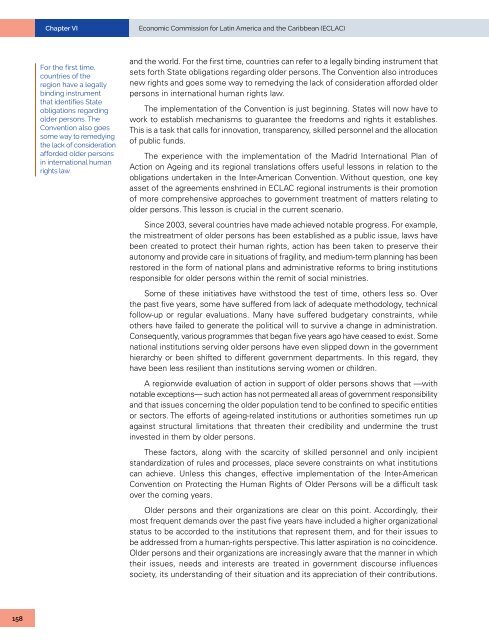Challenges to the autonomy and interdependent rights of older persons
Rapid population ageing in Latin America and the Caribbean brings multiple challenges and requires action to ensure the fair distribution of resources to meet the needs of all age groups in society. It also requires a change in attitudes, policies and practices to improve older persons’ quality of life. In this regard, the effective inclusion of older persons has to do with equitable access to different services and social and economic benefits, as well as the guarantee of their human rights.
Rapid population ageing in Latin America and the Caribbean brings multiple challenges and requires action to ensure the fair distribution of resources to meet the needs of all age groups in society. It also requires a change in attitudes, policies and practices to improve older persons’ quality of life. In this regard, the effective inclusion of older persons has to do with equitable access to different services and social and economic benefits, as well as the guarantee of their human rights.
Create successful ePaper yourself
Turn your PDF publications into a flip-book with our unique Google optimized e-Paper software.
Chapter VI<br />
Economic Commission for Latin America <strong>and</strong> <strong>the</strong> Caribbean (ECLAC)<br />
For <strong>the</strong> first time,<br />
countries <strong>of</strong> <strong>the</strong><br />
region have a legally<br />
binding instrument<br />
that identifies State<br />
obligations regarding<br />
<strong>older</strong> <strong>persons</strong>. The<br />
Convention also goes<br />
some way <strong>to</strong> remedying<br />
<strong>the</strong> lack <strong>of</strong> consideration<br />
afforded <strong>older</strong> <strong>persons</strong><br />
in international human<br />
<strong>rights</strong> law.<br />
<strong>and</strong> <strong>the</strong> world. For <strong>the</strong> first time, countries can refer <strong>to</strong> a legally binding instrument that<br />
sets forth State obligations regarding <strong>older</strong> <strong>persons</strong>. The Convention also introduces<br />
new <strong>rights</strong> <strong>and</strong> goes some way <strong>to</strong> remedying <strong>the</strong> lack <strong>of</strong> consideration afforded <strong>older</strong><br />
<strong>persons</strong> in international human <strong>rights</strong> law.<br />
The implementation <strong>of</strong> <strong>the</strong> Convention is just beginning. States will now have <strong>to</strong><br />
work <strong>to</strong> establish mechanisms <strong>to</strong> guarantee <strong>the</strong> freedoms <strong>and</strong> <strong>rights</strong> it establishes.<br />
This is a task that calls for innovation, transparency, skilled personnel <strong>and</strong> <strong>the</strong> allocation<br />
<strong>of</strong> public funds.<br />
The experience with <strong>the</strong> implementation <strong>of</strong> <strong>the</strong> Madrid International Plan <strong>of</strong><br />
Action on Ageing <strong>and</strong> its regional translations <strong>of</strong>fers useful lessons in relation <strong>to</strong> <strong>the</strong><br />
obligations undertaken in <strong>the</strong> Inter-American Convention. Without question, one key<br />
asset <strong>of</strong> <strong>the</strong> agreements enshrined in ECLAC regional instruments is <strong>the</strong>ir promotion<br />
<strong>of</strong> more comprehensive approaches <strong>to</strong> government treatment <strong>of</strong> matters relating <strong>to</strong><br />
<strong>older</strong> <strong>persons</strong>. This lesson is crucial in <strong>the</strong> current scenario.<br />
Since 2003, several countries have made achieved notable progress. For example,<br />
<strong>the</strong> mistreatment <strong>of</strong> <strong>older</strong> <strong>persons</strong> has been established as a public issue, laws have<br />
been created <strong>to</strong> protect <strong>the</strong>ir human <strong>rights</strong>, action has been taken <strong>to</strong> preserve <strong>the</strong>ir<br />
au<strong>to</strong>nomy <strong>and</strong> provide care in situations <strong>of</strong> fragility, <strong>and</strong> medium-term planning has been<br />
res<strong>to</strong>red in <strong>the</strong> form <strong>of</strong> national plans <strong>and</strong> administrative reforms <strong>to</strong> bring institutions<br />
responsible for <strong>older</strong> <strong>persons</strong> within <strong>the</strong> remit <strong>of</strong> social ministries.<br />
Some <strong>of</strong> <strong>the</strong>se initiatives have withs<strong>to</strong>od <strong>the</strong> test <strong>of</strong> time, o<strong>the</strong>rs less so. Over<br />
<strong>the</strong> past five years, some have suffered from lack <strong>of</strong> adequate methodology, technical<br />
follow-up or regular evaluations. Many have suffered budgetary constraints, while<br />
o<strong>the</strong>rs have failed <strong>to</strong> generate <strong>the</strong> political will <strong>to</strong> survive a change in administration.<br />
Consequently, various programmes that began five years ago have ceased <strong>to</strong> exist. Some<br />
national institutions serving <strong>older</strong> <strong>persons</strong> have even slipped down in <strong>the</strong> government<br />
hierarchy or been shifted <strong>to</strong> different government departments. In this regard, <strong>the</strong>y<br />
have been less resilient than institutions serving women or children.<br />
A regionwide evaluation <strong>of</strong> action in support <strong>of</strong> <strong>older</strong> <strong>persons</strong> shows that —with<br />
notable exceptions— such action has not permeated all areas <strong>of</strong> government responsibility<br />
<strong>and</strong> that issues concerning <strong>the</strong> <strong>older</strong> population tend <strong>to</strong> be confined <strong>to</strong> specific entities<br />
or sec<strong>to</strong>rs. The efforts <strong>of</strong> ageing-related institutions or authorities sometimes run up<br />
against structural limitations that threaten <strong>the</strong>ir credibility <strong>and</strong> undermine <strong>the</strong> trust<br />
invested in <strong>the</strong>m by <strong>older</strong> <strong>persons</strong>.<br />
These fac<strong>to</strong>rs, along with <strong>the</strong> scarcity <strong>of</strong> skilled personnel <strong>and</strong> only incipient<br />
st<strong>and</strong>ardization <strong>of</strong> rules <strong>and</strong> processes, place severe constraints on what institutions<br />
can achieve. Unless this changes, effective implementation <strong>of</strong> <strong>the</strong> Inter-American<br />
Convention on Protecting <strong>the</strong> Human Rights <strong>of</strong> Older Persons will be a difficult task<br />
over <strong>the</strong> coming years.<br />
Older <strong>persons</strong> <strong>and</strong> <strong>the</strong>ir organizations are clear on this point. Accordingly, <strong>the</strong>ir<br />
most frequent dem<strong>and</strong>s over <strong>the</strong> past five years have included a higher organizational<br />
status <strong>to</strong> be accorded <strong>to</strong> <strong>the</strong> institutions that represent <strong>the</strong>m, <strong>and</strong> for <strong>the</strong>ir issues <strong>to</strong><br />
be addressed from a human-<strong>rights</strong> perspective. This latter aspiration is no coincidence.<br />
Older <strong>persons</strong> <strong>and</strong> <strong>the</strong>ir organizations are increasingly aware that <strong>the</strong> manner in which<br />
<strong>the</strong>ir issues, needs <strong>and</strong> interests are treated in government discourse influences<br />
society, its underst<strong>and</strong>ing <strong>of</strong> <strong>the</strong>ir situation <strong>and</strong> its appreciation <strong>of</strong> <strong>the</strong>ir contributions.<br />
158


















